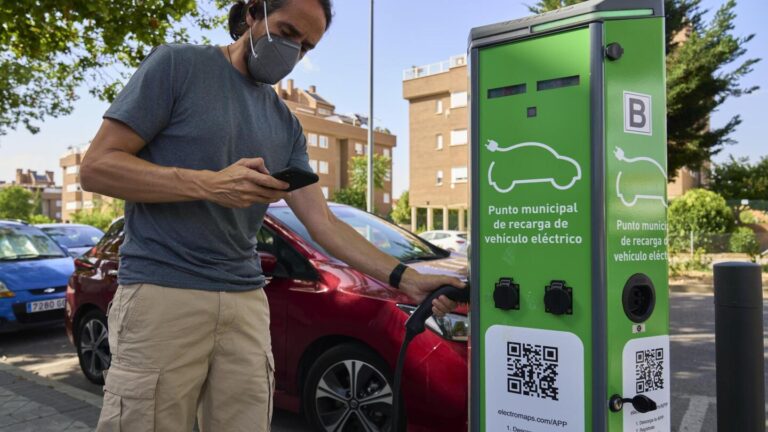BARCELONA, Spain (AP) — Daniel Sanchez is one of Spain’s luckiest electric-car owners: A free charging station less than a kilometer from his home just north of Barcelona keeps his Tesla ready to go.
“I can’t imagine stopping at a gas station again,” said the 41-year-old trucking company owner. “I feel like the people who got off the carriage and got into their cars. There’s no turning back.”
Other Spaniards are less enthusiastic: A lack of charging stations and high electric car prices compared to Western and Northern Europe have left Spain lagging behind in the continent’s race to go green.
Now the government wants to lead the whole country into this new paradigm.
The ruling left-wing coalition plans to allocate most of the 140 billion euros ($166 billion) Spain stands to receive from the European Union’s pandemic recovery plan to reinvigorating the electric car industry.
European Commission President Ursula von der Leyen arrived in Madrid on Wednesday at the start of a tour of member states to approve plans to inject huge amounts of extra revenue into Europe to ease the economic pain caused by the pandemic. Final approval from Brussels is expected within weeks.
Ms von der Leyen met with Prime Minister Pedro Sanchez, who likened the EU Next Generation Fund to “a new Marshall Plan”.
Spain’s Industry Minister Raul Blanco told The Associated Press that the government aims to spend about 5 billion euros ($6 billion) on electric vehicle efforts over the next three years.
Spain produced 2.2 million cars and trucks in 2020, making it Europe’s second-largest producer after Germany, but just 140,000 of those were electric or hybrid vehicles, according to the Spanish Association of Automobile and Truck Manufacturers (ANFAC).
“What we’re doing is accelerating the change that’s already happening,” Blanco said. “This is a unique opportunity. The automakers are on board and they have the resources to make the investments.”
Spain, a leader in high-speed electric rail, wants to put another 250,000 electric cars on its roads within two years, adding to the 96,000 currently on the road.
Spain is aiming to switch entirely to renewable energy by 2050 in line with EU targets, and the government predicts that promoting electric vehicles should reduce CO2 emissions by 450,000 tonnes.
“Spain can run these industrial activities with green energy,” Blanco said. “Compared to Central and Eastern European countries that are still dependent on fossil fuels, or that use nuclear power, Spain can rely on renewable energies because of wind and solar.”
Environmental group Greenpeace supported the push for electric cars but said EU funds should not be used to keep cities crowded with cars.
“It is vital that we prioritise and support rural residents who have poor access to other transport alternatives,” the organisation said.
Spain is banking on its robust auto industry and lithium deposits it shares with Portugal — key to making batteries for electric cars. The goal is to encourage private investment in building battery factories, assembly plants and software design to establish a supply chain that will get more green cars rolling off the production line.
But there are obstacles to the success of this plan.
According to a 2020 report from the European Court of Auditors, Spain has fewer than two public plug-in points per 100,000 square kilometres, while Germany, Belgium and the Netherlands have more than 10.
“It’s a snake biting its own tail,” said Salvador Ejarque, president of the Spanish Association of Electric Vehicle Users (AUVE). “People don’t buy cars because they can’t charge them, and those who can invest don’t do so right away because the bureaucracy is complicated and time-consuming.”
The government wants to increase the total number of charging points nationwide from 11,500 to 100,000 within three years.
Automakers’ group ANFAC said further measures may be needed.
“We must overcome drivers’ ‘autonomy anxiety’ by assuring them that charging their car is as easy as filling up with gas,” spokesman José López Tafal told The Associated Press. “We need to draw up a calendar with the goal of reaching 340,000 charging points by 2030.”
Price matters, too: the average annual salary in Spain is 15,000 euros ($18,100) lower than the EU average, and luxury cars are rare in Spanish cities, where budget models and motorbikes dominate. So while electric cars may appeal to wealthy Europeans, their price tag will be a shock to many Spaniards.
To overcome this, the government has already allocated 400 million euros ($484 million) to offer discounts of up to 7,000 euros ($8,400) on the purchase of electric and hybrid cars.
And while Germany and France have the advantage of having major manufacturers based in their countries, they also need to convince automakers that Spain is the best place for them to invest.
Spanish carmaker Seat, part of the Volkswagen Group, has committed to producing electric cars in the 20,000-25,000 euro range, which Blanco believes will be the right price point for domestic consumers.
Ford’s European president, Stuart Lawley, spoke with Sanchez in April about “Ford’s battery procurement strategy and the importance of support from the Spanish government within the framework of the EU Next Generation Fund,” the company said in a statement provided to The Associated Press.
Renault also reaffirmed its focus on building hybrid vehicles at its Spanish factories.
Trade unions have welcomed the huge public investment in an industry that accounts for 10 percent of Spain’s GDP and 9 percent of employment.
Garbine Espejo, industry secretary for trade union federation CCOO, said Nissan’s recent decision to close factories in and around Barcelona was a warning of what can happen if the private and public sectors do not work together.
“The Spanish auto industry is doing well,” Espejo told The Associated Press, “but if we miss this opportunity to turn Spain into a leader in new technologies, the consequences for the industry and jobs would be disastrous.”
___
Find all AP coverage on climate change issues at https://apnews.com/hub/climate


